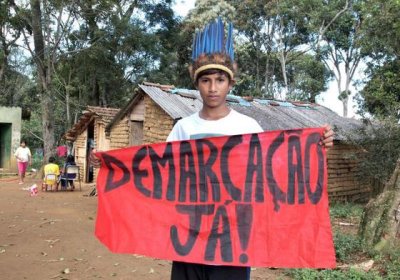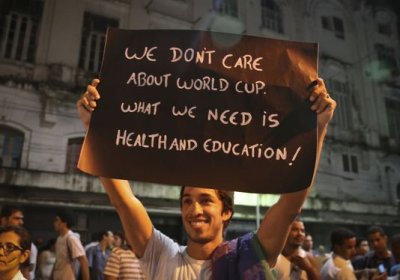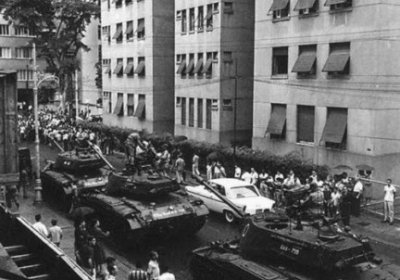A 13-year-old boy from Brazil’s Guarani tribe makes a political stand in front of 70,000 football fans and what he thinks is an international audience. A movement led by indigenous women in the United States beats a billion-dollar brand of the big, bad NFL.
These two stories share more than the fact that they took place during the same week. They share the ways that people in power have sought to combat their courage by trying to render them invisible.
Brazil
Before returning to the favela (local neighbourhood) Vila Autodromo for the first time since 2012, I had already been told that the community would not look the same. As a friend said to me, “It will resemble a perfect smile with several teeth knocked out.”
Vila Autodromo is just yards away from the site of the 2016 Rio Olympic village. Olympic planners, as well as building interests, have long targeted this close-knit community for demolition.
Dave Zirin speaks to DemocracyNow! on the World Cup You Won't See on TV: Protests, Tear Gas, Displaced Favela Residents.
By criticising the 2014 World Cup and the spending priorities of the Brazilian government, Brazilian football legend Pele has accomplished the rarest of feats in 21st century sports media: he has shown the capacity to shock and surprise.
“It’s clear that politically speaking, the money spent to build the stadiums was a lot, and in some cases was more than it should have been,” Pele said during a lecture at Anahuac University in Mexico City.
For people just tuning in, the idea that people in Brazil would be protesting the 2014 World Cup makes about as much sense as New Yorkers' rebelling against pizza.
And yet here we are, less than one month before the start of the Cup, and demonstrations bear the slogan #NãoVaiTerCopa, or "There will be no Cup".
April marks the 50th anniversary of the US-backed military coup d’etat in Brazil. The coup kicked off a brutal 20 military dictatorship.
Military coups followed in Bolivia, Chile, Uruguay and Argentina. With the support of the US government and Paraguay, under dictator General Alfredo Stroessner, the region's regimes organised Operation Condor, a political repression and terror campaign to suppress opposition.
The International Criminal Court (ICC) was established in 2002 at The Hague in the Netherlands to prosecute individuals alleged to have committed war crimes, crimes against humanity and the crime of genocide.
From the ICC’s inception, the US objected to the possibility that its nationals could be subject to the court’s jurisdiction.
Former Brazilian president Lula, who helped found the ruling Workers’ Party (PT) and governed from 2003–2010, took his time to comment on the wave of protests that erupted in mid-June, bringing millions onto the streets.
But when he finally gave an interview, he warmly welcomed the protests: “Brazil is living an extraordinary moment in the affirmation of its democracy. We are a very young democracy ... It’s only to be expected that our society should be a walking metamorphosis, changing itself at every moment.”
One has to hark back to 1968 in Mexico City, when thousands of students and workers marched against the Olympics, to find a sports-related demonstration that compares to the size and militancy of the mass anti-World Cup/Olympic protests taking place in Brazil.
As in Mexico City, thousands of people in Brazil took to the streets — and outside of stadiums hosting Confederations Cup matches — raising slogans that connect the spending and austerity that surround these mega-events to a much deeper rot in the nation’s democratic institutions.
The Unified Workers Central (CUT), other trade union confederations and the Movement of Landless Rural Workers (MST) decided on June 25, to jointly organise a protest on July 11 across the entire country.
They also decided on the items to present to Brazilian President Dilma Rousseff.
The planned strikes and demonstrations will aim to unleash the agenda of the working class in Congress and in ministries, as well as building on and promoting the agenda that has emerged from the recent street protests.
Brazil is in revolt. What started as a protest about a R$0.20 rise (about $0.10) in bus fares has turned into a mass nationwide movement against corruption, the rising cost of living, starved public services and money squandered on sporting mega-events.
Events are moving fast with protests growing and spreading to new cities each day, and it is far from clear when or how it will end.
I travelled to Brazil last September to investigate preparations for the 2014 World Cup and 2016 Olympics. It was painfully evident that the social disruption of hosting two mega-events in rapid succession would be profound.
Everyone with whom I spoke in the community of social movements agreed that these sports extravaganzas were going to leave major collateral damage.
Everyone agreed that the spending priorities for stadiums, security, and all attendant infrastructure were monstrous given the health and education needs of the Brazilian people.
- Previous page
- Page 14
- Next page









